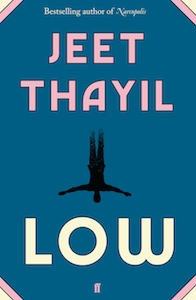Jeet Thayil: Low – grief’s seedy distractions | reviews, news & interviews
Jeet Thayil: Low – grief’s seedy distractions
Jeet Thayil: Low – grief’s seedy distractions
Fine writing on low living but where’s the outsider appeal?

Like many writers, Jeet Thayil is a bit of an outsider. And, if his track record is anything to go by, he has been happy to keep it that way.
After courting one literary prize (the 2012 Man Booker) and picking up another (the 2013 DSC Prize for South Asian Literature), his sophomore effort, The Book of Chocolate Saints, questioned just how much we can tell from the outside looking in. Recounting the life of a fictional painter from multiple perspectives (while omitting the artist’s own), the 500-page many-voiced monster conjured up its own Frankensteinian composite of the real-life stars of the 70s and 80s Bombay underground, including the late, great writer and poet, Dom Moraes, Thayil’s close friend and mentor who also battled with addiction to alcohol.
Moraes lends his name to the protagonist of Thayil’s latest, much slimmer and, sadly, much more conventional novel, Low. It follows recently bereaved writer Dom Ullis as he takes the freshly cremated ashes of his wife Aki, a publishing house editor, on a coke, smack and meow meow-fuelled weekend-long bender in modern-day Mumbai. With the supposed aim of immersing the ashes in clean water according to Hindu custom, Ullis – or Ulysses, as one character willfully mishears – ends up touring the city, mingling unexpectedly and indiscriminately with politicians and pushers, hotel heiresses and heroin addicts.
 With this translucently autobiographical story – Thayil lost his wife, also a publishing house editor, suddenly in 2007 – the author steps into the mainstream, slipping comfortably into the current vogue of auto-fiction. There are echoes of Ben Lerner’s urban musings in 10:04 (Ullis, like Thayil, spent several years in New York), the brief encounters of Rachel Cusk’s Outline trilogy (which, like Low, kicks off with meeting a stranger on a plane) but also, less palatably, the Trumped-up Twitter-fed twitchiness of Crudo by Olivia Laing.
With this translucently autobiographical story – Thayil lost his wife, also a publishing house editor, suddenly in 2007 – the author steps into the mainstream, slipping comfortably into the current vogue of auto-fiction. There are echoes of Ben Lerner’s urban musings in 10:04 (Ullis, like Thayil, spent several years in New York), the brief encounters of Rachel Cusk’s Outline trilogy (which, like Low, kicks off with meeting a stranger on a plane) but also, less palatably, the Trumped-up Twitter-fed twitchiness of Crudo by Olivia Laing.
Despite the now familiar casing, there are some gems inside. Thayil, always a fine writer on low living, is very good on drugs – teasing out the aural suggestions of Mandrax for example, or describing cocaine as having descended on Mumbai in the early 2000s “like a dirty white blanket”. He is even better (perhaps too good) on Trump, his Indian counterpart Modi and the general rot in world politics. However, the frequently apocalyptic aspersions, though intended to distract from the guilt Ullis feels for not having noticed his wife’s descent into depression – “the low” – also detract from the emotional import of the novel.
In contrast to the narrator’s arresting insights and verbal acrobatics (including an extended pun or two), the story of Ullis’s relationship with Aki – who reappears ghostly during his drug trips to confront him with choice moments from their brief, troubled marriage – proceeds with a wan predictability not entirely helped by its postmodern tic of signposting the déjà-vu: “the bells are an omen” and “more about this meeting in a later chapter”. This may prove the book’s point that “Grief, like time, is circular” or that it is all a neat fiction to justify Ullis’s bad behaviour, but such gestures do not easily move a reader to sympathy.
The back-and-forth can also be wearing, and is especially present in the novel’s seemingly less self-aware habit of appealing to precedents. The book abounds with literary and cultural references Ullis’s personality and career are supposedly patterned on, playing a sort of Poundian flash-card game which comes close to the shallow nostalgia or disregard of the "new Indian, uninterested in the past" he critiques. Again, it may all be a gentle satire on the vanity or self-indulgence of writers, but the approach has an obvious pitfall: Ullis is bad company.
Thayil is capable of deepening that nostalgia elsewhere in the novel, and he has done so in the past. By plumbing a sort of collective consciousness, he gave life to his first novel’s recollections. His third and, he has said, final poetry collection, These Errors are Correct, is a moving evocation of love and grief. Both are elegies – one for a wife, the other for a city – with the ego removed. At best, Low, which tries to address both, demonstrates Thayil thinking, very cleverly, inside the box, and largely inside Dom’s and his own head. No doubt he will find, by feeling, a way back out.
- Low by Jeet Thayli (Faber, £14.99)
- Read more book reviews on theartsdesk
The future of Arts Journalism
You can stop theartsdesk.com closing!
We urgently need financing to survive. Our fundraising drive has thus far raised £49,000 but we need to reach £100,000 or we will be forced to close. Please contribute here: https://gofund.me/c3f6033d
And if you can forward this information to anyone who might assist, we’d be grateful.

Subscribe to theartsdesk.com
Thank you for continuing to read our work on theartsdesk.com. For unlimited access to every article in its entirety, including our archive of more than 15,000 pieces, we're asking for £5 per month or £40 per year. We feel it's a very good deal, and hope you do too.
To take a subscription now simply click here.
And if you're looking for that extra gift for a friend or family member, why not treat them to a theartsdesk.com gift subscription?
more Books
 'We are bowled over!' Thank you for your messages of love and support
Much-appreciated words of commendation from readers and the cultural community
'We are bowled over!' Thank you for your messages of love and support
Much-appreciated words of commendation from readers and the cultural community
 Joanna Pocock: Greyhound review - on the road again
A writer retraces her steps to furrow a deeper path through modern America
Joanna Pocock: Greyhound review - on the road again
A writer retraces her steps to furrow a deeper path through modern America
 Mark Hussey: Mrs Dalloway - Biography of a Novel review - echoes across crises
On the centenary of the work's publication an insightful book shows its prescience
Mark Hussey: Mrs Dalloway - Biography of a Novel review - echoes across crises
On the centenary of the work's publication an insightful book shows its prescience
 Frances Wilson: Electric Spark - The Enigma of Muriel Spark review - the matter of fact
Frances Wilson employs her full artistic power to keep pace with Spark’s fantastic and fugitive life
Frances Wilson: Electric Spark - The Enigma of Muriel Spark review - the matter of fact
Frances Wilson employs her full artistic power to keep pace with Spark’s fantastic and fugitive life
 Elizabeth Alker: Everything We Do is Music review - Prokofiev goes pop
A compelling journey into a surprising musical kinship
Elizabeth Alker: Everything We Do is Music review - Prokofiev goes pop
A compelling journey into a surprising musical kinship
 Natalia Ginzburg: The City and the House review - a dying art
Dick Davis renders this analogue love-letter in polyphonic English
Natalia Ginzburg: The City and the House review - a dying art
Dick Davis renders this analogue love-letter in polyphonic English
 Tom Raworth: Cancer review - truthfulness
A 'lost' book reconfirms Raworth’s legacy as one of the great lyric poets
Tom Raworth: Cancer review - truthfulness
A 'lost' book reconfirms Raworth’s legacy as one of the great lyric poets
 Ian Leslie: John and Paul - A Love Story in Songs review - help!
Ian Leslie loses himself in amateur psychology, and fatally misreads The Beatles
Ian Leslie: John and Paul - A Love Story in Songs review - help!
Ian Leslie loses himself in amateur psychology, and fatally misreads The Beatles
 Samuel Arbesman: The Magic of Code review - the spark ages
A wide-eyed take on our digital world can’t quite dispel the dangers
Samuel Arbesman: The Magic of Code review - the spark ages
A wide-eyed take on our digital world can’t quite dispel the dangers
 Zsuzsanna Gahse: Mountainish review - seeking refuge
Notes on danger and dialogue in the shadow of the Swiss Alps
Zsuzsanna Gahse: Mountainish review - seeking refuge
Notes on danger and dialogue in the shadow of the Swiss Alps
 Patrick McGilligan: Woody Allen - A Travesty of a Mockery of a Sham review - New York stories
Fair-minded Woody Allen biography covers all bases
Patrick McGilligan: Woody Allen - A Travesty of a Mockery of a Sham review - New York stories
Fair-minded Woody Allen biography covers all bases
 Howard Amos: Russia Starts Here review - East meets West, via the Pskov region
A journalist looks beyond borders in this searching account of the Russian mind
Howard Amos: Russia Starts Here review - East meets West, via the Pskov region
A journalist looks beyond borders in this searching account of the Russian mind

Add comment